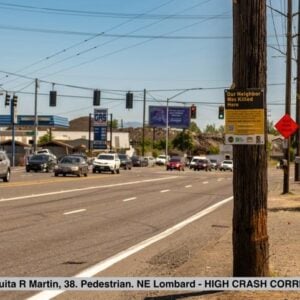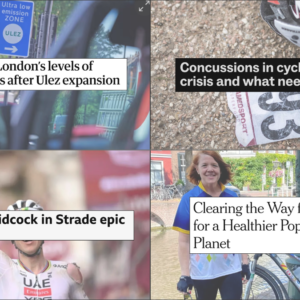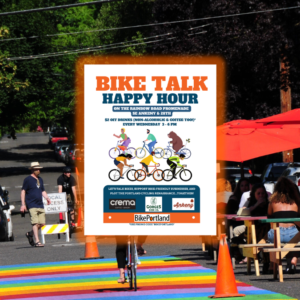An article published today in the Wall Street Journal (by Portland resident Nancy Keates) examines how far U.S. cities have come in their quest to emulate cycling successes in Europe and the challenges we cities face in becoming on par with world-class bike-friendly cities like Amsterdam.
The article also features a quote from Portland City Commissioner Sam Adams. Here’s the link (it will only last for 10 days):
Adams and a contingent of Portland planners and advocates visited Amsterdam back in October of 2005. Portland’s love affair with Amsterdam has been well-documented on this site, but this excerpt from the article (which includes the Adams quote) touches on the challenges we face in copying their success,
“Officials from some American cities have made pilgrimages to Amsterdam. But in the U.S., bike commuters face more challenges, including strong opposition from some small businesses, car owners and parking-garage owners to any proposals to remove parking, shrink driving lanes or reduce speed limits. Some argue that limiting car usage would hurt business. “We haven’t made the tough decisions yet,” says Sam Adams, city commissioner of Portland, Ore.”
Adams knows all about “tough decisions”. He’s currently trying to re-engineer two major streets in downtown Portland and must make make them safe and efficient for all users, balancing the needs of motorists, the business community and cyclists.
The article is full of interesting insights. Here’s one that shows how much more difficult it is purchase and drive a car in Europe,
“Amsterdam and Copenhagen are generally safer for bikers than the U.S. because high car taxes and gasoline prices tend to keep sport-utility vehicles off the road. In Denmark, the tax for buying a new car is as high as 180%. Drivers must be over 18 to get a license, and the tests are so hard that most people fail the first few times“.
And what about the dangers from semis and delivery trucks?
“… cities have worked to train truck drivers to look out for bikers when they turn right at intersections, and changed mirrors on vehicles and at traffic corners so they’re positioned for viewing cyclists.”
I was surprised to read that even in Amsterdam, not everyone loves bikes,
“Even in Amsterdam, not everyone is pro-biking. Higher-end shops have already moved out of the city center because of measures to decrease car traffic …and now shops in the outer ring of the city are vulnerable. Bikes parked all over the sidewalk are bad for business, he adds.”
And this one really resonated with me,
“the Danish Cyclist’s Federation, says that to make progress it can’t be too confrontational and must recognize that many bikers also have cars. “Our goal is the right means of transportation for the right trips.“
At the end of the article, there’s a table that compares bike-friendly metrics of several U.S. cities including; Boulder, Palo Alto, Madison, Davis, and others. Here’s what they said about Portland:
“Though there are lots of hills and rain, this city has 163 miles of bike lanes. All but two bridges accommodate bicyclists. There’s still a long way to go: The city still has 38 miles of bike lanes left in order to achieve its master plan. But in some neighborhoods bike commuters are as high as 9%.”
The only thing about this article that makes me bristle is how the headline tries to create a conflict when one doesn’t exist. The title of the story says bike-friendly cities are “launching a new attack on car culture.” But notice the quote from the leader of the Dutch Cycling Federation. He says, “progress can’t be too confrontational.”
I notice this type of cyclist vs. motorist dichotomy often in U.S. media coverage. Hopefully someday, as the dominant transportation paradigm shifts away from the single-occupancy vehicle (and more editors begin riding), this will change.
Despite a Dutch bike invasion in North America, we still have a long way to go before the vast majority of countrymen are ready to release their grip on the steering wheel and embrace cycling instead.







Thanks for reading.
BikePortland has served this community with independent community journalism since 2005. We rely on subscriptions from readers like you to survive. Your financial support is vital in keeping this valuable resource alive and well.
Please subscribe today to strengthen and expand our work.
I find it very interesting that here in the US, even the cities with the most arterial miles of bike lanes only have about 20% of the people commuting by bike. Now, that’s about 3-4x the percentage in Portland, and about 3x the percentage of bike-enabled arterials. That would seem to indicate that the cultural component is a factor, because Colombia, Denmark and the Netherlands are getting higher percentages of bike commuters than the “best” cities in the US.
What I wish the article’s chart had done is list the total bike miles (paths, lanes, shared roads, etc) along with other bike infrastructure / projects: signage, training & education, indoor parking, secure parking, showers / lockers, and law enforcement responsiveness to theft. These factors go a long way towards encouraging people to bike.
I think it’s inevitable that carbon regulation and peak oil effects on fuel prices will change transportation away from cars and toward bikes, especially in cities — without any confrontation at all. The problem with relying solely on this market-based mechanism is that it will come so quickly that it will cause potentially massive economic instability. To avoid that problem, we have to be proactive in changing the transportation system’s incentives more slowly and starting now (actually yesterday) before it’s too late to change it without adversely affecting the economy.
As Sam Adams says, we have to start making the tough choices now. Those choices are going to be vigorously opposed by vested special interests with huge amounts of political power, so conflict is inevitable. So it’s important to be constructive and always remember why this is being done — it’s necessary for our survival as a society. And the great thing about it is there are reasons that appeal to folks of all political persuasions (stereotype warning): The liberals want to save the environment, and the conservatives want to tell the Arabs to pound sand. Bikes help us do both.
Just wondering if anyone (in Amsterdam/Holland or Portland) can provide concrete examples of how bicycle amenities are *bad for business*
And if any attempts have been made to prove/disprove anecdotal claims.
I guess I’m so completely skeptical that bicycles are bad for business because in a business core, I have a feeling that commercial real estate occupancy rates and tax structures benefiting centrally located businesses (or suburban incentives to relocate businesses/residences) might be more *bad for business* than the % of people who choose bicycling as their mode of transport.
In other words, it may behoove the cycling community to stay abreast on economic development issues in PDX to ensure that developers and such don’t resort to an *easy-out* by saying bikes are bad for business.
In Amsterdam, they’ve worked to reduce truck delivery volume and conflicts by limiting delivery hours and by only allowing small delivery trucks in parts of the city.
They also created neighborhood package delivery and mailing centers where merchants and locals can pick up and drop off packages. This means that every individual store doesn’t need to have a truck loading zone, or even a street that is accessible to trucks. Apparently it’s made a huge difference in noise pollution too.
Amazing: “In Amsterdam, 40% of commuters get to work by bike. In Copenhagen, more than a third of workers pedal to their offices.”
And these places continue to INCREASE their spending on bike infrastructure. You get a real sense they aren’t resting on their laurels; they are not content. Contrast that to the current state of affairs here in Stumptown government. Sad.
It’s funny that bikes being chained up outside an establishment “are bad for business” (presumably because they look bad? or is there an argument that they disrupt pedestrian traffic?) but streets lined with thousands of parked cars are fine…
I have always thought one of the main reasons bikes are so stigmatized here is their dual role as both transportation and recreation vehicles. When I’m riding to a meeting downtown on my bright orange bike, I’m not taken as seriously as if I were in a car — I must be just screwing around, so I should make way for the people with real stuff to do in their cars… but perhaps I’m just reading too much into people’s motives.
I took the “bad for business” quip to refer only to super high-end shops that are moving to the outskirts of town — sounds like a status thing.
“Bad for business” because customers can’t park their cars close enough?
“the tests are so hard that most people fail the first few times.”
That is how it should be here. The car is a death machine, and it should be treated as such. It should not be so easy to get a license to operate a vehicule that kills 76,000 people a year.
Having traveled to several Asian countries where a majority of people were using bikes, I’ve witnessed what happens when bike parking has not been properly planned. If you have bikes parked by the hundreds, solidly lining the sidewalks, it’s very difficult to walk along the sidewalks and shop. From this perspective, I can see the reasoning for an anti-bike stance from some businesses. I wonder if this could be a similiar line of thought for some European businesses? Once again, it all comes down to proper planning…
“Doctors say the drunk riders tend to run into poles.”
Lies!
Just thinking about Amsterdam and Copenhagen makes me realize how far we have to go. But eventually, we’ll have our tipping point – when bikes become seen as an essential part of doing business, and no planning or development decision can be made without consideration of bikes.
One day, I hope that little fringe car-advocacy groups will have to band together to insist that the city maintains access to the few car-legal streets left, and they have “group drives” to show their solidarity. We’ll be generous, and get out of their way when they do that, say, on the last Friday of every month. Maybe they’ll be escorted by a special squad of Police who are trained to drive cars.
peejay,
In a few short years when gasoline/biodiesel/ethanol costs $10.00 a gallon or more and hydrogen still can’t be stored in a car without an expensive refrigerated tank, then the roads will belong to bicycles and a small fleet of government and commercial vehicles. (Think about it: when “Peak Oil” is proved, wouldn’t the government want to keep it all for commercial applications and the military? Why let lazy yups drive Tahoes around town when Wal-Mart needs the fuel to keep goods on shelves?)
I don’t many wealthy L.O. and West Hills residents will ever bother to arrange a CM for cars.
It’s coming.
It is peculiar how the WSJ would focus on the conflicts between bikes and business without mentioning their potential to promote and expand local business… especially in the context of world trends Clearly they are an opportunity for all those off-shore bound petro dollars to get rechanneled into local bike shops as well as other businesses.
Doesn’t say much for the WSJ as a source for cutting-edge business information.
The Sustainable Industries Journal had an interesting article this month entitled “Cyclorama: It’s boom time in the bike business:”
http://www.sijournal.com/